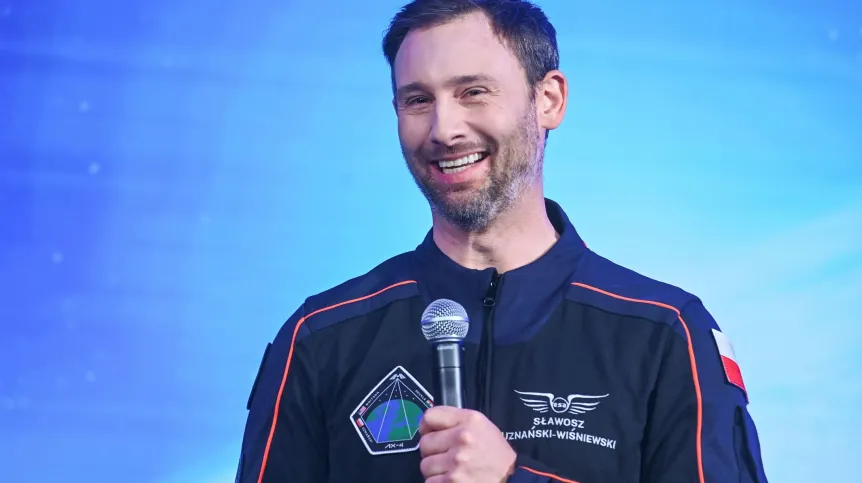
Scientists from the Gdańsk Academy of Physical Education and Sport want to check how isolation and microgravity affect the stress level of astronauts. The first part of the experiment as part of the IGNIS mission has already begun. Sławosz Uznański-Wiśniewski took part in it.
The study 'Lowering Stress Response During Isolation in Astronauts / NEUROFEEDBACK EEG' is one of 13 experiments that Sławosz Uznański-Wiśniewski will conduct on the International Space Station (ISS) as part of the Polish scientific and technical mission IGNIS. In addition to the Polish astronaut, another member of the Axiom 4 mission, Hungarian Tibor Kapu, will take part in the experiment.
The project originator and manager is Marcin Dornowski, PhD, a professor at the Gdańsk Academy of Physical Education and Sport, chairman of the Medical Section of the Commission of Space Sciences of the Polish Academy of Sciences (Gdańsk branch). His team members are Professor Inna Sokołowska, Milena Lachowicz, PhD, and Tomasz Szot, PhD. The scientific unit responsible for the implementation of the experiment is the Academy of Physical Education and Sports in Gdańsk.
According to Dornowski, Sławosz Uznański-Wiśniewski's examination, which took place on Monday in Warsaw, went according to plan: 'All assumptions have been fulfilled, the astronaut is prepared for the flight and knows what to do before takeoff'.
The scientist adds that his team began by checking the level of Uznański-Wiśniewski's brain waves at specific EEG points and selecting those that 'would require intervention', i.e. lowering or increasing them. 'We showed what training should look like. The astronaut saw and checked the training device. Tomorrow we are flying to the United States and we will take it with us, it will be waiting for him in Houston. He will conduct a dozen or so sessions on his own before launch into orbit', Dornowski explains.
'We want to check how EEG neurofeedback affects astronauts. The aim of the study is to reduce their level of stress, which will probably occur due to long-term isolation', explains Milena Lachowicz, head of the Department of Psychology at the Faculty of Physical Education of the Academy of Physical Education and Sports in Gdańsk.
She adds that before their departure to the ISS, astronauts will perform specially prepared training sessions aimed at optimising the bioelectric activity of the brain, and these will include tasks or special games, such as the flying carpet (astronauts will learn to control their brain waves based on feedback), and they will also do relaxation and breathing exercises. 'Brain waves can be trained. Neurofeedback uses this phenomenon to help the brain learn specific reactions. This method can improve memory and concentration, reduce stress and anxiety', the psychologist explains.
Dornowski's team intends to check how the conditions on the International Space Station affect stress, emotions, fulfilment of basic needs and performing precise tasks. The astronauts' psychomotor functions will also be examined.
Dornowski's team flies to Houston, Texas (USA), to examine the second member of the AX-4 crew, Tibor Kapu, at the Axiom Space training centre. Both astronauts will undergo psychological tests on the ISS, and Polish scientists will examine them again after returning to Earth.
The AX-4 crew consists of: Peggy Whitson (USA) - mission commander; Sławosz Uznański-Wiśniewski (Poland/ESA) - mission specialist; Shubhanshu Shukla (India) - mission pilot, and Tibor Kapu (Hungary) – mission specialist. The mission is officially scheduled to launch no earlier than May; unofficially, it will most likely launch at the turn of June. The astronauts will fly to the ISS on the SpaceX Falcon 9 rocket, which will carry the Dragon spacecraft into orbit from NASA's Kennedy Space Center in Florida. The astronauts will spend about 16 days on the International Space Station.
The Ax-4 mission will be another commercial crewed expedition carried out by Axiom Space. The Pole's participation in this mission is the result of an agreement signed between the Polish Ministry of Development and Technology and ESA to prepare and conduct the Polish scientific and technological mission IGNIS to the ISS. The Polish Space Agency (POLSA) is also involved in the preparations as an executive agency of the Ministry of Technology and Technology.
PAP - Science in Poland, Anna Bugajska (PAP)
abu/ bar/ js/













